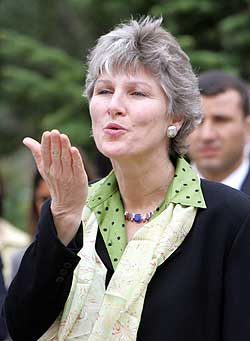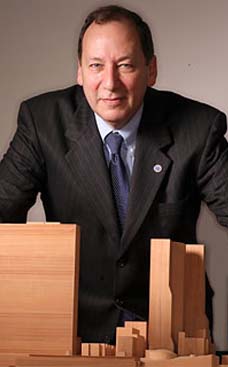
Karen Hughes, one of the most prominent figures in the US administration, on Tuesday said that it would take “decades” to overcome the intense hostility around the world towards the US, arguing that Washington was at the early stages of “a long struggle” to improve its image. Less than a week after announcing her departure from the state department as under-secretary for public diplomacy and public affairs, Ms Hughes acknowledged that opinion polls show the US is now viewed much less favourably by people in Pakistan, Turkey and Indonesia than in recent years. Ms Hughes has spent the past two years boosting the department’s public diplomacy effort. Among its key goals has been what she calls “an aggressive effort” to empower US ambassadors and public affairs officers to give media appearances and a big boost to educational and exchange programmes. Ms Hughes argued that the impact of this effort would be felt over the long term. “We are in the early years of a long struggle. We didn’t get here quickly. Reactions have been exacerbated by images of war and disagreements about our decision to go into Iraq.”
Karen Hughes says it would take “decades” to overcome the intense hostility around the world towards the US
US ‘at start of struggle’ for image
By James Blitz in London
Published: November 6 2007 22:38 | Last updated: November 6 2007 22:38
Karen Hughes, one of the most prominent figures in the US administration, on Tuesday said that it would take “decades” to overcome the intense hostility around the world towards the US, arguing that Washington was at the early stages of “a long struggle” to improve its image.
Less than a week after announcing her departure from the state department as under-secretary for public diplomacy and public affairs, Ms Hughes acknowledged that opinion polls show the US is now viewed much less favourably by people in Pakistan, Turkey and Indonesia than in recent years.
However, Ms Hughes told the Financial Times in an interview that opinion polls could not be expected to show any improvement in Muslim views of the US while conflicts in Iraq and Afghanistan continued.
Asked about the growing disenchantment of Muslim communities with the US in recent years, Ms Hughes, a close confidante of George W. Bush, US president, said: “It is legitimate to say this is what the polls show but to expect they would change at a time of war without any other dramatic change is not reasonable.”
Instead, she argued that the strengthening of the state department’s public diplomacy effort on her watch would plant the seeds for a significant improvement in US international relations.
Ms Hughes has spent the past two years boosting the department’s public diplomacy effort. Among its key goals has been what she calls “an aggressive effort” to empower US ambassadors and public affairs officers to give media appearances and a big boost to educational and exchange programmes. Ms Hughes argued that the impact of this effort would be felt over the long term. “We are in the early years of a long struggle. We didn’t get here quickly. Reactions have been exacerbated by images of war and disagreements about our decision to go into Iraq.”
But she insisted that the anti-US “cauldron of hate” had been boiling many years before the 2001 attacks in the US.
Ms Hughes acknowledged that the administration had been too slow to realise the importance of engaging with the international community at the time of the invasion of Iraq.
She said the Clinton presidency had made a mistake in winding down the state department’s public diplomacy programme in the 1990s, after the end of the cold war.
However, she added: “When I arrived at the state department in 2005, I found that what had happened in 2003 and 2004 was we hadn’t been engaging in the debates in Europe, attending the conferences, we hadn’t been appearing on the TV shows.” Asked whether the arrival of a new president in 2009 would be an opportunity to improve the US image abroad, she said: “Any major change is an opportunity for people to take a new look. But it’s hard to say what impact it will have.”













